A suffragan bishop is a type of bishop in some Christian denominations.
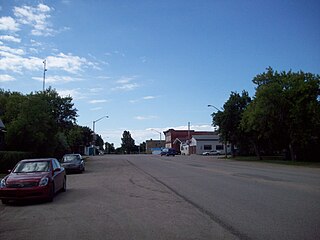
Qu'Appelle is a town in Saskatchewan, located on Highway 35 approximately 50 kilometres (31 mi) east of the provincial capital of Regina.

James Butler Knill Kelly was a bishop of the Church of England active in the British colony of Newfoundland and Scotland. Kelly was a participant in the first Lambeth Conference, which was a crucial step in the creation of the Anglican Communion. He was also Primus of the Scottish Episcopal Church from 1901 to 1904.

The Diocese of Nova Scotia and Prince Edward Island is a diocese of the Ecclesiastical Province of Canada of the Anglican Church of Canada. It encompasses the provinces of Nova Scotia and Prince Edward Island and has two cathedrals: All Saints' in Halifax and St. Peter's in Charlottetown. Its de facto see city is Halifax, and its roughly 24 400 Anglicans distributed in 239 congregations are served by approximately 153 clergy and 330 lay readers according to the last available data. According to the 2001 census, 120,315 Nova Scotians identified themselves as Anglicans, while 6525 Prince Edward Islanders did the same.

The Diocese of Auckland is one of the thirteen dioceses and hui amorangi of the Anglican Church in Aotearoa, New Zealand and Polynesia. The Diocese covers the area stretching from North Cape down to the Waikato River, across the Hauraki Plains and including the Coromandel Peninsula.
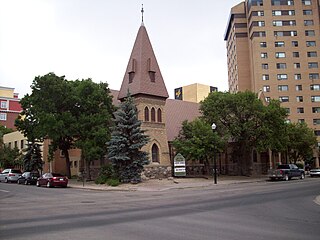
St Paul's Anglican Cathedral is an historic church building located on the outskirts of Regina's central business district. Built as a parish church in 1894–1895, it became the pro-cathedral of the Anglican Diocese of Qu'Appelle in southern Saskatchewan, Canada, in 1944 when pro-cathedral status was removed from St Peter's, Qu'Appelle, in the eponymous former see city which had become moribund. In 1973, when it had become clear that the once-planned grand cathedral for Regina — at the corner of Broad Street and College Avenue — was no longer a feasible project, its status was raised to that of cathedral.
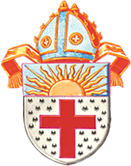
The Diocese of Qu'Appelle in the Anglican Church of Canada lies in the southern third of the civil province of Saskatchewan and contains within its geographical boundaries some 50 per cent of the province's population of one million.

Peter Alan Broadbent, known as Pete Broadbent, is an English Anglican bishop. He served as the Bishop of Willesden, an area bishop in the Church of England Diocese of London for twenty years, 2001–2021. During the vacancy in the diocesan see from 2017 to 2018, he served as Acting Bishop of London.

The Anglican Church of South America is the ecclesiastical province of the Anglican Communion that covers six dioceses in the countries of Argentina, Bolivia, Paraguay, Peru, and Uruguay.

The Anglican ministry is both the leadership and agency of Christian service in the Anglican Communion. Ministry commonly refers to the office of ordained clergy: the threefold order of bishops, priests and deacons. More accurately, Anglican ministry includes many laypeople who devote themselves to the ministry of the church, either individually or in lower/assisting offices such as lector, acolyte, sub-deacon, Eucharistic minister, cantor, musicians, parish secretary or assistant, warden, vestry member, etc. Ultimately, all baptized members of the church are considered to partake in the ministry of the Body of Christ.
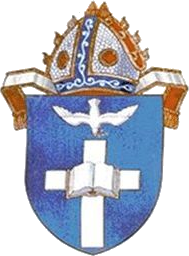
The Anglican Diocese of Armidale is a diocese of the Anglican Church of Australia located in the state of New South Wales. As the Diocese of Grafton and Armidale, it was created by letters patent in 1863. When the Anglican Diocese of Grafton was split off in 1914, the remaining portion was renamed Armidale, retaining its legal continuity and its incumbent bishop.
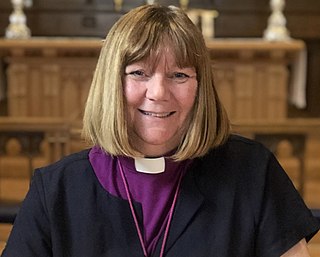
Jane Alexander is a British-Canadian Anglican bishop. She is a former Bishop of Edmonton, a bishop of the Anglican Church of Canada. She was installed on May 11, 2008, at All Saints' Anglican Cathedral.
The Archbishop of Melanesia is the spiritual head of the Anglican Church of Melanesia, which is a province of the Anglican Communion in the South Pacific region, covering the nations of Solomon Islands and Vanuatu. From 1861 until the inauguration of Church of the Province of Melanesia in 1975, the Bishop of Melanesia was the head of the Diocese of Melanesia.

William John Burn was an Anglican colonial bishop in the late 19th century.
Edwin Hubert Knowles was an Anglican bishop in the second quarter of the 20th century.
Duncan Douglas Wallace was the 10th Bishop of Qu'Appelle in the Anglican Church of Canada.

Gregory Kerr-Wilson is a bishop of the Anglican Church of Canada. He is the current Archbishop of Calgary.

William Grant Cliff is a Canadian Anglican bishop and musician. Since 2023, Cliff has been the 13th bishop of the Diocese of Ontario, prior to which he was bishop of the Anglican Diocese of Brandon.
Helen Jane Kennedy is a bishop of the Anglican Church of Canada. She is the current bishop of the Diocese of Qu'Appelle in southern Saskatchewan.
Daniel Christian Gifford is an American-born Canadian bishop of the Anglican Church in North America. In February 2022, he was consecrated as coadjutor bishop of the Anglican Network in Canada and succeeded Charlie Masters as diocesan bishop of ANiC in November 2022. He was previously archdeacon for the Vancouver area in ANiC and vicar of St. John's Vancouver.















